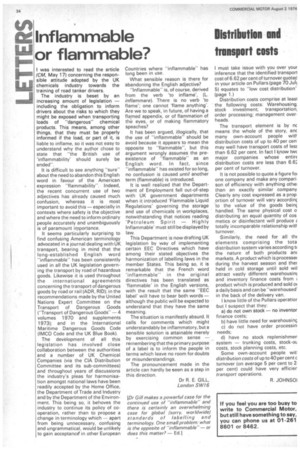Inflammable Distribution and or flammable? transport costs I was interested
Page 36

If you've noticed an error in this article please click here to report it so we can fix it.
to read the article (CM. May 17) concerning the responsible attitude adopted by the UK chemicals industry towards the training of road tanker drivers.
The industry is beset by an increasing amount of legislation — including the obligation to inform drivers about the risks to which they might be exposed when transporting loads of "dangerous" chemical products. This means, among other things, that they must be properly informed if the load, or part of it, is liable to inflame, so it was not easy to understand why the author chose to state that "the British use of 'inflammability' should surely be ended".
It is difficult to see anything "sure" about the need to abandon this English word in favour of the American expression "flammability". Indeed, the recent concurrent use of two adjectives has already caused much confusion, whereas it is most important to avoid this — especially in contexts where safety is the objective and where the need to inform ordinary people accurately and unambiguously is of paramount importance.
It seems particularly surprising to find confusing American terminology advocated in a journal dealing with UK transport, bearing in mind that the long-established English word "inflammable" has been consistently used in all the UK legislation governing the transport by road of hazardous goods. Likewise it is used throughout the international agreements concerning the transport of dangerous goods by road or rail (ADR, RID); in the recommendations made by the United Nations Expert Committee on the Transport of Dangerous Goods ("Transport of Dangerous Goods" — 4 volumes 1970 and supplements 1973); and in the International Maritime Dangerous Goods Code (IMCO Code and the UK Blue Book).
The development of all this legislation has involved close collaboration between the authorities and a number of UK Chemical Companies (via the CIA Distribution Committee and its sub-committees) and throughout years of discussions the industry's pleas for harmonisation amongst national laws have been readily accepted by the Home Office, the Department of Trade and Industry and by the Department of the Environment. This •being so, it behoves the industry to continue its policy of cooperation, rather than to propose a change in terminology which — apart from being unnecessary, confusing and ungrammatical, would be unlikely to gain acceptance' in other European Countries where "inflammable" has long been in use.
What sensible reason is there for abandoning the English adjective?
"Inflammable" is, of course, derived from the verb 'to inflame', (L. inflammare). There is no verb 'to flame"; one cannot 'flame anything'. Are we to speak, in future, of having a flamed appendix, or of flammation of the eyes, or of making flammatory speaches?
It has been argued, illogically, that the use of "inflammable" should be avoid because it appears to mean the opposite to "flammable", but this argument wrongly assumes the preexistence of "flammable" as an English word. In fact, since "inflammable" has existed for so long, no confusion is caused until another term (flammable) is introduced.
It is well realized that the Department of Employment fell out-of-step with UK government departments when it introduced 'Flammable Liquid Regulations' governing the storage and use of chemicals in workplaces, notwithstanding that notices reading 'Petroleum Spirit — Highly Inflammable' must still be displayed by law.
This Department is now drafting UK legislation by way of implementing certain .EEC Directives which have among their stated objectives the harmonization of labelling laws in the member States. This being so, it is remarkable that the French word 'inflammable" in the original directives has been translated as 'flammable' in the English versions, with the result that the same "EEC label' will have to bear both words — although the public will be expected to understand that they have the same meaning.
The situation is manifestly absurd. It calls for comments which might understandably be inflammatory, but a sensible solution is attainable merely by exercising common sense — remembering that the primary purpose of a label is to inform the people in terms which leave no room for doubts or misunderstandings.
The pronouncement made in the article can hardly be seen as a step in this direction.
Dr R. E. GILL, London SW16




























































































